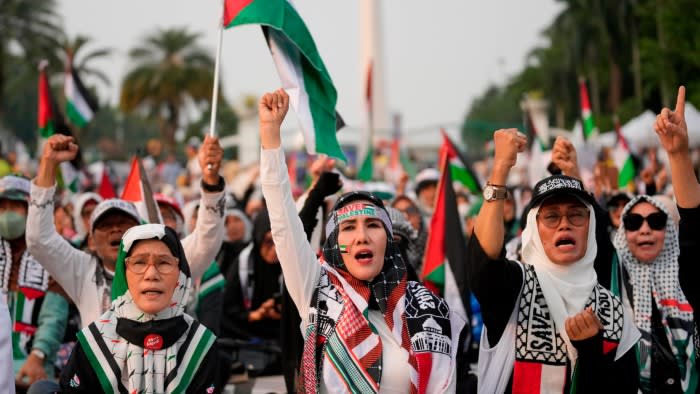Stay informed with free updates
Simply sign up to the Retail & Consumer industry myFT Digest — delivered directly to your inbox.
General Atlantic and CVC have paused multimillion-dollar stake sales in companies operating US fast food brands in Indonesia and Malaysia as protests and boycott campaigns over the Israel-Hamas war disrupt business.
Consumers in Muslim-majority Indonesia and Malaysia have shunned US brands since the start of Israel’s assault on Gaza in October.
The brands, including Starbucks, KFC and Pizza Hut, are being targeted over Washington’s support for Israel, even though they have emphasised their neutrality on the conflict. The companies operating the brands under a franchise model have also stressed that the fast food businesses are domestically owned.
General Atlantic paused the sale of its 20 per cent stake in Starbucks operator Map Boga Adiperkasa in December, according to two people familiar with the situation. The stake in Map Boga Adiperkasa, which has a market capitalisation of $285mn and is one of Indonesia’s largest fast food franchise operators, is valued at about $54mn.
“It was impossible to sell a stake as a growth opportunity when sales are down, expansion plans are being scaled back, employees are being harmed in stores and there is no sign of the boycott ending,” said one person familiar with General Atlantic’s strategy.
CVC Capital Partners, one of Europe’s biggest private equity firms, has also halted the sale of its 21 per cent stake in Malaysia’s QSR Brands, the country operator of KFC and Pizza Hut, due to the boycotts, according to two other people with knowledge of the decision.
One of the people said the sale was paused due to several factors, including not getting the desired valuation. Malaysia’s QSR is privately held and does not reveal financials. The stake was valued at more than RM1.2bn ($252mn) last year, according to local media reports.
The freeze on the stake sales by the global private equity groups underscores the severity of the boycotts in a region home to 250mn of the world’s Muslims.
“People are shifting from food and beverage brands to beauty brands. The boycott is much more substantial now as opposed to symbolic,” said Nirgunan Tiruchelvam, head of consumer and internet at Aletheia Capital, an advisory group focused on the Asia-Pacific region.
Unilever, which makes Dove personal care products and Knorr stock cubes, said in February that its Indonesia sales dropped 15 per cent in the fourth quarter of 2023 as a result of boycotts.
Starbucks Indonesia has said it is not affiliated in any way with the war in the Middle East and in a statement on its website said it did not provide any financial support to the Israeli government or army.
General Atlantic and Map Boga Adiperkasa declined to comment. CVC and QSR Brands did not respond to requests for comment.
Brands in the mid-to-low price range have been most affected, according to Calista Muskitta, an analyst at Indonesian bank BCA Sekuritas. Pizza Hut has rebranded some outlets in Indonesia to “Ristorante”, in what Muskitta said was an attempt to blunt the impact of the boycott, though she said it appeared to have limited success.
Mitra Adiperkasa, the Indonesian retail company that owns 79 per cent of Starbucks operator Map Boga Adiperkasa, told analysts during an earnings call in April that it had initially planned to open 100 food and beverage stores this year but is now targeting half that amount partly due to the boycotts.
Starbucks franchises in Malaysia are also seeing an impact. Berjaya Food, which operates Starbucks in the country, last month reported a net loss of RM42.6mn in the final three months of 2023, against a net profit of RM35.5mn one year earlier.
Malaysian tycoon Vincent Tan, who founded Berjaya Food’s parent company, called the boycotts “unnecessary” in March. More than 80 per cent of its employees are Malaysian, and the US brand does not own any share in the operations.
But the boycotts are likely to continue as the war drags on, said Tiruchelvam. Consumers may start to lose steam eventually, but for now the campaigns remain in “full swing”, he said.


